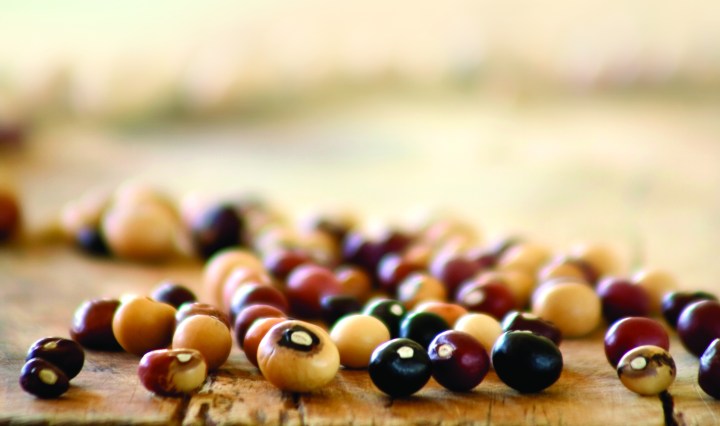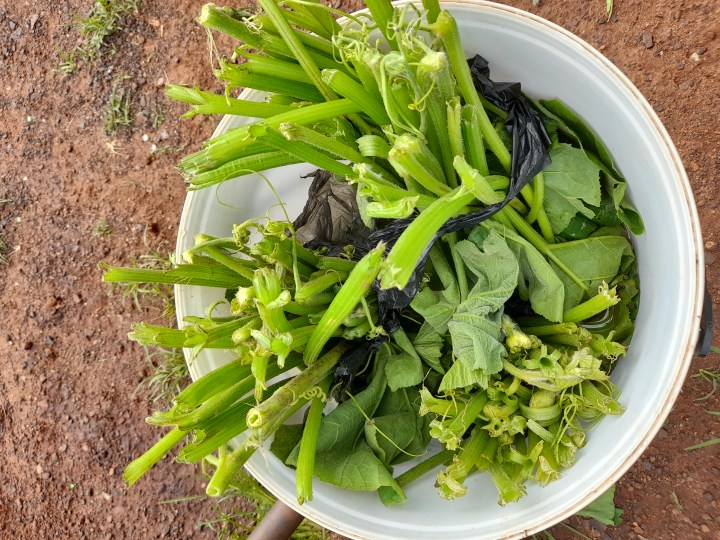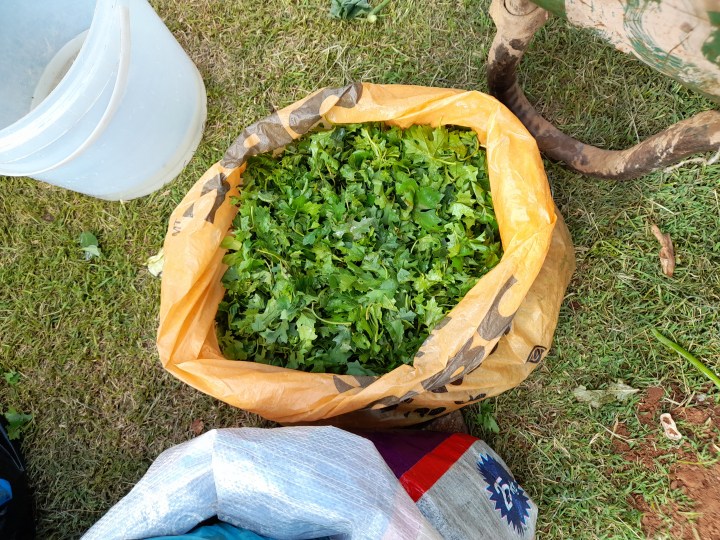KHUTSONG TREASURE
The lovely local food of the other Rivonia Market

There are plenty of places that have neither fallen prey to the mall masquerading-as-market phenomenon nor yet been bothered by the attention of Instagram’s epicurean elite. The Rivonia market in Khutsong, Carltonville is (almost) one such spot.
Lovely local food is always the order of the day at Khutsong’s fabulous farmers’ market. Same name, different locaPreview (opens in a new tab)tion. This story is not about Johannesburg’s Rivonia craft market but rather relates to the Rivonia farmers’ market in Khutsong, Carltonville. The former is fine but the latter is so fantastic that it has restored my faith in such spots. Clearly, my recovered consumer confidence is neither here nor there – this bustling West Rand township trading post does not exist to bring joy to outsiders like me. Its purpose is to buy and sell inexpensive, super-fresh, predominantly organic, fruit and vegetables grown by the food gardeners of Khutsong to the people of Khutsong.
Every trader is a grower. Every customer can point out the garden, plot or field where each offering was nurtured into existence. Which is exactly as it should be. But so often isn’t. It is easy to become cynical about businesses billing themselves as “farmers markets” when so many of them are little more than carefully curated, outdoor, food courts with rustic décor. Cashing in on consumer naivety by reselling wholesale goods at premium prices is all too common. The most obvious warning signs that you are in a faux farmers’ market are stalls replete with uniform, out of season/out of region produce and vendor ignorance/obfuscation pertaining to provenance or usage.

Beans growing up a fence made from old bedsprings in Khutsong food garden belonging to Linda Mvelase and Nkageleng Tlelima. (Photo: Anna Trapido)
Even where the offering is authentic, many formerly fabulous farmers’ markets have been overrun by foodie fashionistas who upset all sorts of apple carts by using them as earthy, alternative brunch venues. They have lengthy conversations over lattes and prioritise socialising over food shopping. Perhaps a punnet of figs or an organic pork pie is purchased but nothing larger will fit into their designer, reusable shopping bags. Enormous posh pushchairs prevent other market-goers from getting at the actual ingredients. All of the above puts off the OG customers who previously did a weekly household grocery shop at the market. In many cases, these virtue-signalling modish hordes are suffocating the trade of the very farmers they purport to support.
I am in no position to judge. Understanding the issue does not mean that I am not part of the problem. I too have spent many happy Saturday mornings “marketing”’– by which I mean sitting on a spruced-up hay bale, having lengthy opinions on everything and nothing while eating pain au chocolat. If I leave with a few sprigs of asparagus and a sourdough loaf, it’s a lot.
The good news is that there are still plenty of places that have neither fallen prey to the mall masquerading-as-market phenomenon nor yet been bothered by the attention of Instagram’s epicurean elite. The Rivonia market in Khutsong, Carltonville is (almost) one such spot – I confess that I have now put several pretty pictures of it on Instagram.

Peanuts sold by the cup at Rivonia Market, Khutsong. (Photo: Anna Trapido)
The township (which is 75 kilometres from Johannesburg) is home to an ardent food gardening community almost all of whom also sell at the local market. Many of these trader-farmers have added to their pre-existing horticultural skills with training in organic cultivation and pest management through community upliftment enterprise, SocioTech.
The venue is a field, close to the reservoir, that I am told becomes the dividing line between rival gang territories at night. There are a few hardcore stall holders selling in the space all week but the main market is on a Wednesday. No one seems sure why the area is called Rivonia but other parts of the township are known as Slovo, Hani and Mandela so maybe there is a Treason Trial link. Apparently, the market is old but this reservoir adjacent location is relatively new and came about because the previous place was developed for houses. When I asked an elderly trader how long the market had served Khutsong. He looked into the distance and offered the opinion that it was “kudaloo!” (from the isiXhosa kudala) with an extended central “ahhh” sound to emphasise just how long ago this long ago was.
The Rivonia traders are doing all the things that idealistic agroecologists advocate for. Local growers sell high quality food to their neighbours – which keeps prices low because produce passes directly from grower to buyer with no intermediary distributors. Traders told me that thanks to SocioTech’s trench bed system their soil is super-rich and needs no help from chemical fertilisers.
Apparently, bugs are no match for the potent thepe (amaranth) and aloe brew that the food gardeners spray onto their crops. The tip I received from the kudaloo guy was to use older thepe that has finished flowering. Once thepe produces flowers, it becomes too bitter to eat as morogo so this secondary use as pesticide is the ultimate waste not, want not use of resources. Food mileage is virtually non-existent as almost all the traders arrive on foot pushing their wares in wheelbarrows.

Produce on its way to Rivonia Market, Khutsong, Carltonville. (Photo Anna Trapido)
Produce is picked only hours before purchase. Such a system has very low barriers to entry and creates economic opportunities in an impoverished area. Amongst the vendors I met was an eight-year-old boy who had grown some cowpeas at the edge of his mother’s plot and was selling them (R10 per cup) because he was raising money: “To go to the saloon (sic) for a German cut.” Buying local ensures that cash is circulated within the community and residents are shielded from the potential threat of disrupted long distance food supply chains. Whether the next such disruption will be the result of pandemic or politics we know not but, either way, an ability to withstand its effects will be a big bonus.
There are very few tables. Most people put plastic sheets on the ground and sit on them surrounded by their homegrown fruit and vegetables. Some sell out of their wheelbarrows. The free-range egg lady is very grand – she does business from the back of a bakkie but that is as posh as it gets. Piles of knobbly, green marakka gourds compete for customer attention with flat, white boer pumpkins and makataan melons. The leaves and stems of all the above are carefully stripped of their stringy, outer prickles and sold separately.

Pumpkin leaves for sale at Rivonia Market, Khutsong. (Photo: Anna Trapido)
Spinach and mustard greens are offered up as string tied bouquets while the unit of measurement for bangala (cleome), young thepe and guxe (okra) leaves is a “Checkers” (plastic supermarket packet). My visit was in summer but everyone assured me that drying of morogo wa dinawa (bean leaf) ensures a year-round supply of heritage greens.
Locally grown peanuts are traded by the cup, as are jewel-like jugo beans (Bambara nuts) and tiny green lethlodi (mung beans). Sweet potatoes (and their leaves) and green mielies galore. The only ingredients not literally grown within a stone’s throw of the market are the cassava and coconuts sold at a stall run by a group of capulana cloth clad Mozambican ladies. Big buckets of atchar (R10 per scoop, R8 if you bring your own margarine tub to take it away) made earlier in the season using Khutsong grown green mangos and some smoked catfish (caught in the nearby Wonderfonteinspruit) were the only processed goods on offer.

Morogo for sale at the Rivonia Market, Khutsong. (Photo: Anna Trapido).
Given the Merafong Municipality’s history of sewage leaks, I opted for the former and not the latter. While there are apricot trees all over the township, the fruit sellers that I spoke to said that they only make jam for home use because as one lady observed: “This market is poor people shopping. They don’t have money to buy jam”.
In addition to the crops, there are also huge piles of second hand clothing for sale. Looking at the logos on the T-shirts and tracksuit tops, my guess is that these garments landed on our shores via US evangelists of some sort. So, if you have a hankering for a jacket bearing the insignia of the Nashville True Love Waits Mission to pair with your reasonably priced, sustainably farmed, seasonal, heritage focused food come to Khutsong. DM/TGIFood
Wednesday Rivonia Market, Khutsong. The GPS coordinates are -26.3299,27.3125. Look for the reservoir or ask for directions at the Choppies Supermarket on the edge of the township. (No card machines or ATMs so bring cash)
The author supports The Saartjie Baartman Centre for Women and Children in Manenberg. Their 24-hour crisis response service provides holistic social work support which includes housing and feeding up to 120 survivors of domestic violence daily.





 Become an Insider
Become an Insider
Comments - Please login in order to comment.